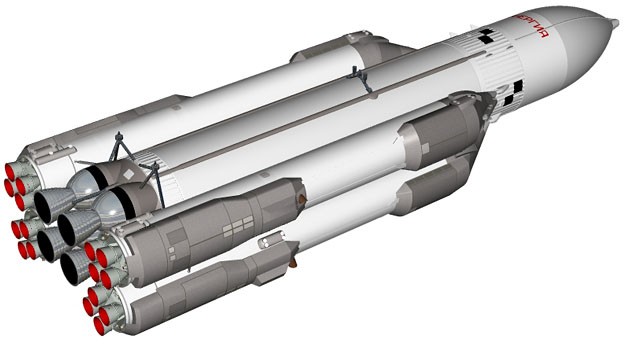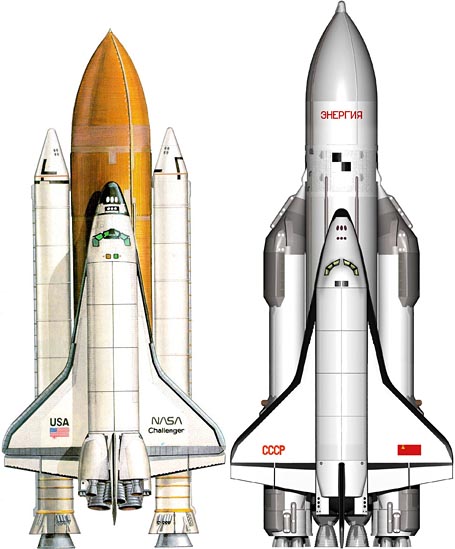
New state-of-the-art russian booster.
(Hamster not included...)

Posted on 01/15/2004 1:11:45 PM PST by presidio9
In an echo of the Cold War space race, Russia said that it had the know-how to relaunch its space exploration programs, a day after Washington laid out ambitious plans to return to the Moon and press on to Mars.
"We have many initiatives from researchers on organizing expeditions to the Moon and Mars," said Nikolai Moiseyev, a deputy director of the Russian Rosaviakosmos space agency.
"Before the end of the year, we intend to develop a federal space program until 2015 and it is possible that such projects would be included," the ITAR-TASS news agency quoted him as saying Thursday.
On Wednesday, US President George W. Bush (news - web sites) unveiled ambitious plans for the United States to return to the Moon as early as 2015, saying a lunar base would serve as a jumping-off point for manned missions to Mars and "across our solar system."
During the Cold War, Washington and Moscow competed fiercely in space exploration, and many Russians are still intensely proud of Soviet achievements in that field.
The Soviet Union scored a major victory on April 12, 1961, when Yury Gagarin became the first man in space. The Americans struck back eight years later, when Neil Armstrong became the first man to step on the Moon on July 20, 1969.
Moscow's space programs had to be considerably scaled back in 1991, when the Soviet Union fell apart and state financing dried up.
But as Washington outlined its plans this week, officials here emphasized that though Russia may be short of financial resources for ambitious space programs, it could hold its own in the field of technology and skills.
An official with the institute that developed the Soviet "Lunokhod" (Moonwalker) robot said that scientists have maintained their research and development efforts and could quickly resume construction.
"If Russia decides to revive its lunar program, we would need a year to create a prototype of a new Lunokhod and two to three years to construct the apparatus," Roald Kremnyev, deputy director of the Lavochkin institute, told ITAR-TASS.
"Russia can overtake USA," an anchorwoman on state television said Thursday, echoing comments the previous day by a top Russian space official who said that Moscow is capable of placing a man on Mars within 10 years at one tenth of the cost of reported US plans.
"Technically, the first flight to Mars could be made in 2014. It would cost around 15 billion dollars (11.7 billion euros) to do it, compared with the American estimate for their project of 150 billion dollars," said Leonid Gorshkov, chief designer with Energia, the Russian space constructor.
And an unnamed official at Energia on Thursday suggested that the United States and Russia should join forces in Mars exploration.
"It would be much more profitable to pool efforts in a manned flight to Mars and the planetary development instead of holding the project independently," the Interfax news agency quoted him as saying.
Russia and the United States have been cooperating in work aboard the International Space Station (news - web sites) since it was launched in 1998.
After the US grounded its shuttle program following the 2003 Columbia disaster Russian rockets were left as the only way to ferry people and supplies to and from the ISS.
Following Bush's speech, NASA (news - web sites) chief Sean O'Keefe spoke by phone with his counterpart at Rosaviakosmos to assure him that the Americans had no intention of withdrawing from the ISS.
"O'Keefe said that there was no talk of NASA withdrawing from the ICC," the Russian agency's spokesman told RIA Novosti.
I looked up some images of Lunohod (circa 1970). It does bear some resemblance to the Mars rovers, but judging from its overall composition, the resemblance is rather limited in that both craft have wheels, an antenna and a solar panel.
Of course, about the time that probe was on Luna, the Apollo astronauts were cruising around their Lunar landing site on a Lunar dune buggy. ; )
With all due respect, perhaps you can regale us with the success of Phobos I, Phobos II and the Buran shuttle (which, if memory serves, went up for action in 2002 for a mere $6 million after making only one unmanned flight).
Yet you would have us believe that Russia is ready to make a journey to Mars? Even though Russia has never managed to get a cosmonaut to the moon?



And don't forget the Buran was virtually a carbon-copy of the Shuttle. Its engines--the RD-0120 (not to be confused with the RD-120) were copies of the SSME with a slightly larger nozzle and a slightly lower thrust. The Russians filed Freedom of Information Act requests (through their embassy) and were given the blueprints, reports, and other documents.
Sometime ago I did a survey of Mars mission success and discovered that well over half the failures were Russian ones.
--Boris
Considering the successes of the space program of both nations, I would say the U.S. is far more prepared than Russia at this time.
I just said that russian space industry may do that for fraction of cost then american space industry.
Yet those savings would be penny-wise and pound-foolish. As another already pointed out, the failure:success ratio in Russian spacefaring is much larger than that of the United States. Bottom line: if given the choice between sending a manned mission to Mars in 10 years for X dollars and not having them return, I'd rather opt for a manned mission to Mars in 20 years for 10*X dollars and have them return safely.
It's never a good idea to cut corners on safety and redundancy. And from the looks of things, that appears to be precisely what the Russian space program does.
Yes, the U.S. space program has 17 casualties to its name. All losses were tragic, but considering how far we've gone, the casualty rate is exceedingly low. If we'd ignored safety and redundancy on the scale that the Russians have consistently done, the work-related mortality of our astronauts could easily have been three- or four-fold what it is.
Consider that Soviets then Russia continuously stayed in space begginning from late 70th. There was almost constatnly space station with 2-3 cousmanauts on board. Each day of all this years.
If the failures are to be framed within the post-Soviet years, then so must the successes in this discussion.
As for the Soviets/Russians having men in space, that is not entirely due to technological superiority; it's more due to the nature of Soviet government that could make such decisions without having to be concerned about public criticism. NASA's accomplishments have been limited not by technological issues, but by Congressional budget cuts due to lack of public support. By 1973, a man on the moon was no longer considered interesting by the average American, even though such a thing was considered the Impossible Dream a mere 5 years before.
The Soviet Union caught us flat-footed and had us beat in the space race with the first satellite, the first man & woman in space, the first space walk and all that. But it was our focus on redundancy and safety (with only nominal concern for the cost of such) that got us to the moon and back, thus effectively beating the Russians at a race in which they held a hefty lead.
This simple fact cannot be lightly dismissed.
Russian SOUZ rocket is safest in the world. There was already about 1500 launches of it. Only few about 5 or 6 failures.
We need more than a rocket to get to Mars. The rocket only gets us into Earth orbit. It's great that the rocket is so successful, but is it reusable? That is a linchpin of the future of space exploration, not disposable rockets.
Recent air leak on ISS was due to american module not russian. No one report it in american press.
On the contrary. That was indeed covered in the American press. I read about it in USA Today, the L.A. Times, Des Moines Register, et cetera.
I personally figured it was only a matter of time before an air leak occurred on the ISS. As I recall, Mir had its share of such things. It only stands to reason that every bug that visited Mir would eventually visit the ISS.
Ask boris. His main reprimand that russians "dump" thier hardware for fraction of cost.
The charge may be spurious, but what do you imagine the production cost of the Buran was? I find it hard to believe it was produced for less than $6 million...yet that's what the asking price was in 2002.
But he told good about ussian launch vehicles or engines for example. Do you know that new american rocket Atlas-5 uses russian engines. American car with russian engine so to speak:)).
Quite true. The engine was better for the purpose of launching commercial satellites. But once again, we need more than just a rocket to get to Mars.
Beleive or not. Russia can do everything America can. And for fraction of cost.
Cool. Then it should be no challenge for Russia to spend the next three years going to the moon 9 times, landing 6 times and safely returning all missions. Once that's done, we'll talk.
You are conveniently forgetting the (October 1960?) launch disaster that vaporized hundreds of souls...on the ground.
--Boris
Challenge is money. Nothing technological. Russia has heavy rocket with 100 tonn capacity the Energy rocket.


"And don't forget the Buran was virtually a carbon-copy of the Shuttle. Its engines--the RD-0120 (not to be confused with the RD-120) were copies of the SSME with a slightly larger nozzle and a slightly lower thrust. The Russians filed Freedom of Information Act requests (through their embassy) and were given the blueprints, reports, and other documents."
This applies to the vehicle, tiles, tankage, and all other major components, not just the engines.
--Boris
Disclaimer: Opinions posted on Free Republic are those of the individual posters and do not necessarily represent the opinion of Free Republic or its management. All materials posted herein are protected by copyright law and the exemption for fair use of copyrighted works.